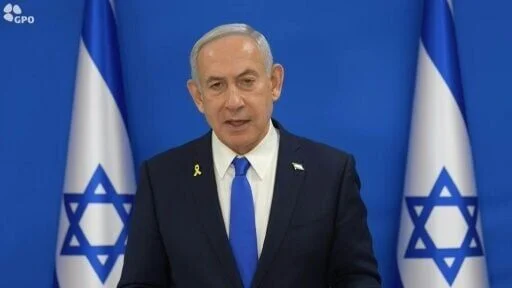JERUSALEM — Israeli Prime Minister Benjamin Netanyahu said Sunday that regime change in Iran is a possible outcome of Israel’s expanding military campaign, as Iran launched another wave of missile strikes targeting Israeli cities amid the deepening conflict.

Speaking to Fox News, Netanyahu declared that “regime change could certainly be the result” of the ongoing Israeli offensive, citing what he described as the Iranian regime’s internal weakness. His remarks came as Israeli airstrikes continued for a third consecutive day, hitting a broad range of targets across Iran, including government facilities and energy infrastructure in Tehran. The sustained bombardment reportedly triggered panic in the capital, with residents fleeing neighborhoods affected by the explosions.
Iran responded hours later with a fresh barrage of ballistic missiles aimed at Israeli territory. Among the locations hit were the southern Israeli town of Netivot and the northern port city of Haifa — a key strategic and commercial hub. Sirens blared across multiple regions, with emergency responders dispatched to assess the damage. No official casualty figures in Israel had been released as of late Sunday.
Iranian state media reported that more than 200 people had been killed in the Israeli strikes since the offensive began, quoting a health ministry spokesperson. The figure, which could not be independently verified, underscores the high toll of the conflict’s rapid escalation.
The strikes and counterstrikes reflect a sharp deterioration in the long-simmering tensions between the two regional powers. Israel has framed its military campaign as a direct response to Iranian efforts to reconstitute and arm proxy groups across the region, while Tehran has accused Israel of violating international law and vows continued retaliation.
Asked late Sunday about possible steps to de-escalate the conflict, President Donald Trump offered a measured yet resolute reply. “Sometimes they have to fight it out,” he said, suggesting that military pressure may ultimately be necessary before diplomacy can succeed.
Trump’s comments, delivered just hours before his departure for the G7 summit in Canada, mark a continuation of his administration’s firm stance on Iran. The White House has maintained that while the United States is not directly involved in Israel’s operations, it supports Israel’s right to self-defense and has warned Tehran against targeting U.S. assets or personnel in the region.
As the fighting intensifies, global leaders have called for restraint amid fears of a broader regional war. European Union officials have urged both sides to halt hostilities and return to diplomatic channels, while China and Russia have condemned the violence and blamed the West for fueling instability.
For now, neither Israel nor Iran shows signs of backing down. Netanyahu, reiterating his position in the Fox News interview, said, “We’ll do what we need to do.” His remarks signal a readiness to continue the campaign, even as international pressure grows.
The situation remains fluid, with the risk of a wider confrontation looming over an already volatile Middle East.



